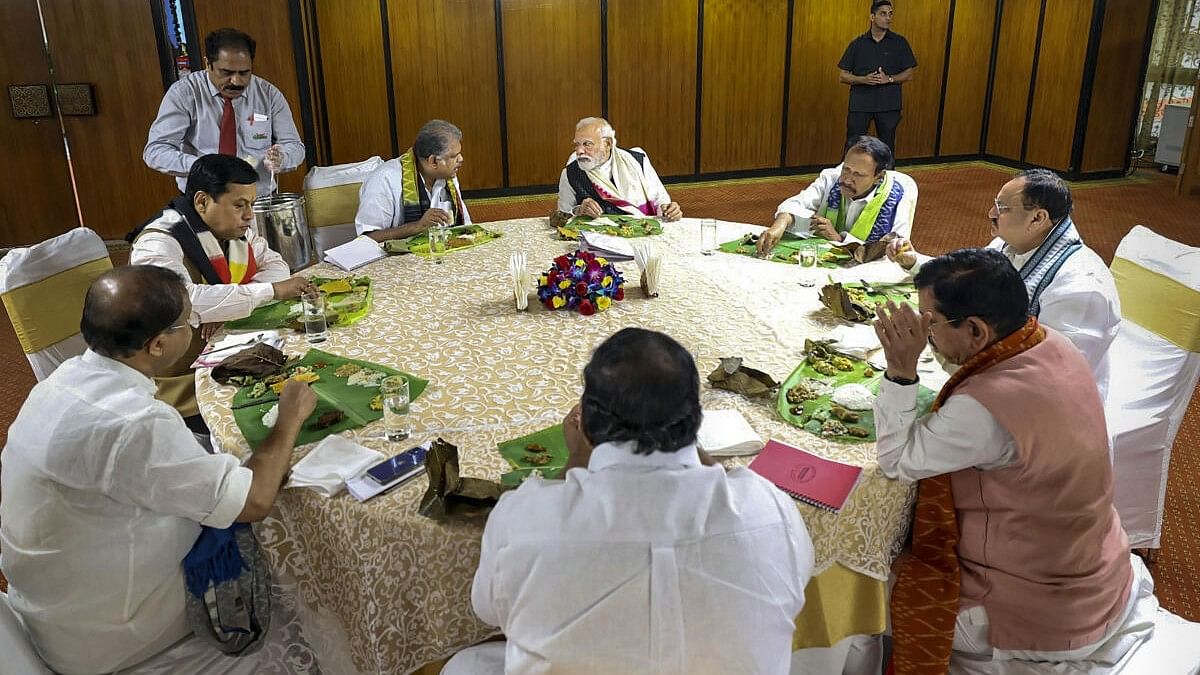
PM Modi with NDA MPs of South India.
Credit: PTI Photo
It would not have been to Prime Minister Narendra Modi’s liking that a day after he extolled the virtues of a ‘government with full majority’ and cited this as the reason for the smooth passage of Nari Shakti Vandan Adhiniyam, Chief Justice of India DY Chandrachud, in Modi’s presence, mentioned the passing of the women’s reservation Bill in Parliament as an example of bipartisan effort.
This underscored the two main modes of governing democracies — one that is consultative where arriving at a consensus on key issues is the objective, and the other which wishes to utilise majorities secured in elections to harness absolute power. While Chandrachud’s contention demonstrated his appreciation of the former, Modi’s claim points towards his inclination for absolutism, and is at variance with his ‘sabka saath’ slogan.
The Prime Minister overlooked that the Bill was passed effortlessly, at least in Rajya Sabha, because the Opposition backed it. However, Chandrachud made it evident that he was of the view that the bipartisan effort that went into passing the Bill, was a continuation of the process when lawmakers from different regions, diverse backgrounds, and even conflicting ideologies, joined forces in the Constituent Assembly to frame the Constitution of India.
Modi’s assertion was at an event held by the Bharatiya Janata Party (BJP) to felicitate the Prime Minister. At the event, he made a case again for single-party majority governments and contended that “a strong and decisive government with absolute majority is very necessary to take the country forward.” Modi added that the passage of the Bill in two consecutive days proved that an absolute-majority government could “take big decisions and cross big milestones”.
Modi’s claim is in stark contrast to the BJP’s recent revival of the National Democratic Alliance (NDA). On July 18, the BJP convened a meeting of an expanded NDA. The BJP, which leads the 35-plus party coalition, said the NDA “completed 25 years of existence” during which it has “established inspiring records in good governance.”
Modi’s declaration at this meeting that “no party is big or small in NDA”, appeared duplicitous because the BJP had not convened a single meeting of the NDA since the victory in the 2019 Lok Sabha polls. The urgency with which the meeting was organised demonstrated his rising anxiety over political developments and the coming together of several opposition parties.
The absence of NDA co-ordination committee meetings, the inadequacy of the consultative process within the council of ministers, and the over-centralisation of the decision-making process demonstrate a proclivity towards an absolutist style of governance. This has been the case since 2014. This has resulted in the Modi government being less inclusive, consultative, and accommodative than the Atal Bihari Vajpayee-led NDA government (1998-2004). As repeatedly demonstrated, especially since 2019, in a nation of social and ethnic diversity, political divergence is essential for democracy to remain vibrant.
Modi denigrates coalition governments, and differentiates the NDA from the other coalitions by calling the latter those “built of negativity and contradictions”.
For centuries now India’s diverse identity groups have existed in coalitions with each other. Such social coalitions are a significant feature of Indian society. Historians point to political alliances as far back as 1937 for the provincial legislature elections held under the Government of India Act of 1935. Independent India’s first government under Jawaharlal Nehru had several people from outside the Congress, some of whom were its bitter critics. They included leaders like B R Ambedkar, Syama Prasad Mookerjee, and experts John Mathai and C D Deshmukh. The Congress acted as an umbrella party, a virtual coalition of various shades of opinion and ideology.
Despite single-party majority being the norm in most elections, formal coalitions existed in several states from the late 1950s. The trend became regular in the late 1960s after the phase of single-party dominance began weakening. After 1984, no party secured a majority on its own till 2014. Yet, India made considerable progress and charted its way by making several reforms in the economy, politics, and society. India’s social justice movement which empowered various underprivileged communities and even the women’s Bill emerged in the pre-2014 coalition era.
The decade-long Congress-led United Progressive Alliance (UPA) government which is particularly targeted by Modi for its ‘weak’ character made great strides in strengthening the welfarist arm of the State by enacting crucial, empowering laws. The current government has utilised many of these for bolstering itself, and has weakened crucial laws like the Right to Information Act using the BJP’s “full majority”. These laws would have been safeguarded had it been a coalition government, like Vajpayee’s, where the BJP did not have a brute majority in the Lok Sabha.
Modi needs to acknowledge that the Women’s Reservation Bill was not passed because numbers were on his side. Instead, the Bill was approved by Parliament because the I.N.D.I.A bloc backed it despite varied positions among coalition partners in the past.
If Modi’s government was more representative and deliberative, we could have seen the immediate rollout of 33 per cent reservation for women, as demanded by many parties and groups unhappy with the current promise of implementing it sometime in the future.
Irrespective of what Modi says, coalitions make politics and policies more inclusive and representative.
(Nilanjan Mukhopadhyay, a Delhi-based journalist, is author of ‘The Demolition and the Verdict: Ayodhya and the Project to Reconfigure India’. Twitter: @NilanjanUdwin.)
Disclaimer: The views expressed above are the author's own. They do not necessarily reflect the views of DH.